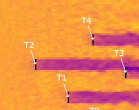Hercules Input Files#
Hercules input files are YAML configuration files that define simulation parameters and component configurations. These files are processed by the load_hercules_input() function in utilities.py to create the h_dict structure that drives the simulation.
Overview#
Input files use YAML format for readability and flexibility. The Loader class in utilities.py extends the standard YAML loader to support !include tags, allowing you to reference external files within your configuration.
Structure#
The input file structure mirrors the h_dict structure documented in the h_dict page. Key sections include:
Top level parameters:
dt,starttime_utc,endtime_utc(see timing for details)Plant configuration:
interconnect_limitHybrid plant configurations:
wind_farm,solar_farm,battery,electrolyzerExternal data:
external_datafor external time series data (e.g., LMP prices, weather forecasts)Optional settings:
verbose,name,description,output_file
Loading Process#
The load_hercules_input() function in utilities.py performs comprehensive validation:
Loads the YAML file using the custom
LoaderclassValidates required keys (
dt,starttime_utc,endtime_utc,plant)Parses and validates UTC datetime strings for
starttime_utcandendtime_utcComputes derived values:
starttime(always 0.0) andendtime(duration in seconds)Ensures
plant.interconnect_limitis present and numericValidates component configurations and types
Sets defaults for optional parameters (e.g.,
verbose: False)
Example#
# Input YAML for hercules
name: example_simulation
description: Wind and Solar Farm Simulation
dt: 1.0
starttime_utc: "2020-01-01T00:00:00Z" # Simulation start in UTC
endtime_utc: "2020-01-01T00:15:50Z" # Simulation end (15 min 50 sec later)
verbose: False
plant:
interconnect_limit: 30000 # kW
wind_farm:
component_type: WindFarm
wake_method: dynamic
floris_input_file: inputs/floris_input.yaml
wind_input_filename: inputs/wind_input.csv
turbine_file_name: inputs/turbine_filter_model.yaml
log_file_name: outputs/log_wind_sim.log
log_channels:
- power
- wind_speed_mean_background
- wind_speed_mean_withwakes
- wind_direction_mean
floris_update_time_s: 30.0
solar_farm:
component_type: SolarPySAMPVWatts
solar_input_filename: inputs/solar_input.csv
lat: 39.7442
lon: -105.1778
elev: 1829
system_capacity: 10000 # kW (10 MW)
tilt: 0 # degrees
log_channels:
- power
- dni
- poa
- aoi
initial_conditions:
power: 2000 # kW
dni: 1000
poa: 1000
battery:
component_type: BatterySimple
energy_capacity: 100.0 # MWh
charge_rate: 50.0 # MW
discharge_rate: 50.0 # MW
max_SOC: 0.95
min_SOC: 0.05
log_channels:
- power
- soc
- power_setpoint
initial_conditions:
SOC: 0.5
controller:
# Controller configuration here
output_file: outputs/hercules_output.h5
log_every_n: 1
External Data Configuration#
Hercules supports loading external time series data from CSV files (e.g., electricity prices, weather forecasts, or other external signals). This data becomes available to controllers through h_dict["external_signals"].
New Format (Preferred)#
external_data:
external_data_file: path/to/data.csv
log_channels:
- lmp_rt
- wind_forecast
Key features:
external_data_file: Path to CSV file withtime_utccolumn and data columnslog_channels: Optional list of channels to log to HDF5 outputIf omitted: all channels are logged (default behavior)
If empty list (
log_channels: []): no channels are loggedIf non-empty list: only listed channels are written to HDF5
Important: All channels are always available to the controller via
h_dict["external_signals"], regardless oflog_channels
Old Format (Deprecated)#
external_data_file: path/to/data.csv # Logs all channels, shows deprecation warning
The old format is still supported for backward compatibility but will show a deprecation warning. It automatically logs all external data channels to the output file.
External Data File Format#
The CSV file must contain:
A
time_utccolumn with UTC timestamps in ISO 8601 formatOne or more data columns with external signals. Note that the names of the other columns are arbitrary; any column names will be carried forward and interpolated. However, the values must be floats. Additionally, some controllers and plotting utilities that work on external signals may require specific column names like
lmp_rt,lmp_da,wind_forecast, etc.
Example lmp_data.csv:
time_utc,lmp_rt,lmp_da,wind_forecast
2024-06-24T16:59:08Z,25.5,20.0,12.3
2024-06-24T17:04:08Z,26.1,20.0,12.5
2024-06-24T17:09:08Z,27.3,20.0,12.8
...
Hercules automatically interpolates external data to match the simulation time step.
Usage in Controllers#
All external data channels are accessible in the controller through h_dict["external_signals"]:
class MyController:
def step(self, h_dict):
# Access external signals (all channels available)
lmp_rt = h_dict["external_signals"]["lmp_rt"]
lmp_da = h_dict["external_signals"]["lmp_da"]
wind_forecast = h_dict["external_signals"]["wind_forecast"]
# Use signals for control logic
if lmp_rt < 15:
h_dict["battery"]["power_setpoint"] = -10000 # charge
elif lmp_rt > 35:
h_dict["battery"]["power_setpoint"] = 10000 # discharge
else:
h_dict["battery"]["power_setpoint"] = 0
return h_dict
Even if log_channels only specifies ["lmp_rt"], the controller can still access all channels. The log_channels setting only controls what gets written to the HDF5 output file.
Selective Logging Examples#
Example 1: Log all channels (default)
external_data:
external_data_file: data.csv
# log_channels not specified → logs all channels
Example 2: Log specific channels
external_data:
external_data_file: data.csv
log_channels:
- lmp_rt
- wind_forecast
# Only logs lmp_rt and wind_forecast (but all channels available to controller)
Example 3: Log no channels
external_data:
external_data_file: data.csv
log_channels: [] # Empty list → logs nothing (but all channels available to controller)
This is useful when you want external data available for control decisions but don’t need it saved in the output file.
Output Configuration Options#
Hercules supports several output configuration options to optimize file size and write performance:
log_every_n#
Controls how often simulation data is logged to the output file:
Default: 1 (log every simulation step)
Example:
log_every_n: 60logs data every 60 simulation stepsThis reduces output file size and improves performance for long simulations
output_file#
Specifies the output file path. Hercules automatically ensures the file has a .h5 extension for HDF5 format.
output_use_compression#
Controls HDF5 compression (default: True). Disable for faster writes if storage space is not a concern.
output_buffer_size#
Controls the memory buffer size for writing data (default: 50000 rows). Larger buffers improve performance but use more memory.
Example with Output Configuration#
# Advanced output configuration example
dt: 1.0
starttime_utc: "2020-06-15T12:00:00Z"
endtime_utc: "2020-06-15T13:00:00Z" # 1 hour simulation
# Log every 60 seconds (1 minute) to reduce file size
log_every_n: 60
output_file: outputs/my_simulation.h5
output_use_compression: true
output_buffer_size: 10000
plant:
interconnect_limit: 5000
wind_farm:
component_type: WindFarm
wake_method: dynamic
floris_input_file: inputs/floris_input.yaml
wind_input_filename: inputs/wind_input.csv
turbine_file_name: inputs/turbine_filter_model.yaml
log_channels:
- power
- wind_speed_mean_background
- wind_speed_mean_withwakes
- wind_direction_mean
floris_update_time_s: 30.0
controller:
Validation#
The load_hercules_input() function performs strict validation on input files to catch configuration errors early. This includes checking for:
Required keys at the top level (
dt,starttime_utc,endtime_utc,plant)Valid UTC datetime strings (ISO 8601 format) for
starttime_utcandendtime_utcAccepts: strings ending with “Z” (explicit UTC) or naive strings (no timezone)
Rejects: strings with timezone offsets (e.g.,
+05:00,-08:00) since the field must be UTC
Logical time ordering (
endtime_utcmust be afterstarttime_utc)Valid component types and configurations
Numeric validation for timing and power parameters
File existence checks for referenced input files
Output configuration validation (
log_every_nmust be a positive integer)Component-specific validation (e.g.,
log_channelsmust be a list of valid channel names)
Invalid configurations will raise descriptive ValueError exceptions to help with debugging.
